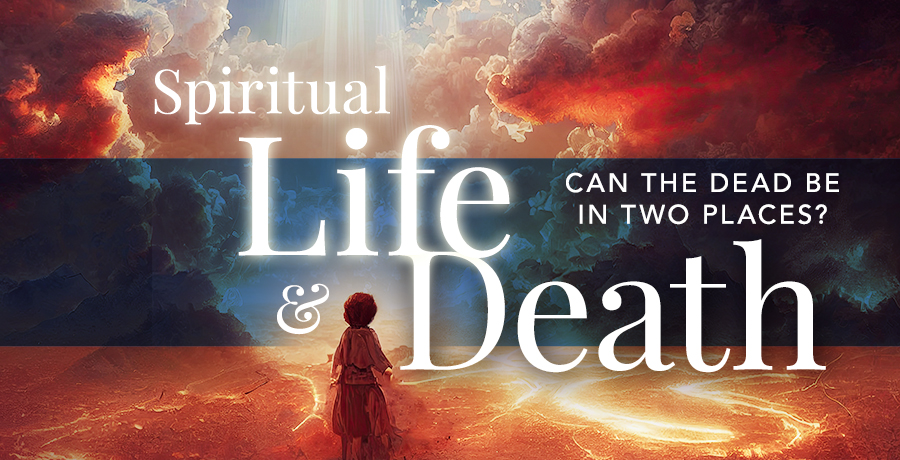Can the dead be in two places?
 As a child raised in the Catholic church, I served for many years as an altar boy, an assistant to the priest during the mass. As an altar boy, I attended many funerals, and it was those funerals that started me in an entirely new direction in life.
As a child raised in the Catholic church, I served for many years as an altar boy, an assistant to the priest during the mass. As an altar boy, I attended many funerals, and it was those funerals that started me in an entirely new direction in life.
During funeral services held in our local church, the priest would invariably say something such as, “We can rejoice today because our beloved friend is now in the presence of God in heaven.” Such words are calculated to encourage, and they often do. But those same words also create a lot of confusion.
A little later as the body of the deceased was slowly lowered into a grave at the local cemetery, the same priest would say something very much like, “And now we commit our loved one to the grave, where he/she will rest peacefully until the day our Lord returns, and the dead in Christ shall rise.”
I may only have been a young child, but I was old enough to smell a rat. Minutes before, the deceased was in the presence of God in heaven. But now, that same individual was resting in a grave awaiting the resurrection. How could the same dead person be in two places at once?
The answer is, of course, that such a thing is not possible. While only a child who had read little of the Bible, I wasn’t exactly sure of the answer to my question. But I knew one thing for sure. The dead couldn’t possibly die and go directly to heaven. What, exactly, would go to heaven? And if my suspicions were accurate, praying to dead saints was therefore unreasonable, as the saints themselves were dead and not able to hear or answer the prayers of a single soul.
When I finally learned that the dead sleep until the return of Jesus, it was less of an “Aha!” moment, and more of a “Well, of course” moment. Some things are obvious. Sleep in death was one of them. And if death was a sleep, purgatory couldn’t possibly exist, no one could possibly be in hell at the present time, and the church I had been part of my entire life had sold me a bill of goods.
But faith in God is not simply a matter of being right. Numerous people have been right—or close to right—theologically and have been on the wrong side of the leading of the Holy Spirit. It’s important to know that the dead sleep. When you do, myriad errors and lies are avoided: the dead do not visit the living; Halloween is a ghastly celebration of spiritualism; houses are not “haunted” by departed spirits; seances are invitations for demons to trouble and misdirect lives; the Virgin Mary has not appeared to anyone, ever, anywhere…and so on.
But there’s a greater truth than any I’ve yet mentioned.
When Jesus visited the home of Mary and Martha following the death of their brother, Lazarus, Martha gave evidence of several things that she, to her credit, knew. She knew that Jesus had the power to save Lazarus from death. She knew there would be a resurrection, believing Lazarus would “rise again in the resurrection at the last day” (John 11:24). But there was something she, or maybe others nearby, needed to know.
“Jesus said to her, ‘I am the resurrection and the life. He who believes in Me, though he may die, he shall live’” (John 11:25). This is the greatest truth in the constellation of truths clustered around the subject of death and the resurrection. Jesus is the resurrection and the life. Possessing Jesus is the difference between eternal life and eternal death. As John wrote, “He who has the Son has life; he who does not have the Son of God does not have life” (1 John 5:12).
Faith in Jesus is simply that. Faith in Jesus. The key factor in the plan of salvation is not the possession of an idea, but the possession of a Person, that Person being Jesus. The weakest saint may, by faith, have Jesus, and the Savior that called Lazarus from his dusty bed is able to bring spiritual life out of spiritual death.
We possess the truth about Jesus, and we should. But possessing Jesus Himself is the real difference. He is the resurrection and the life. The dead will be resurrected because they lived in faith in Him. The living have the assurance of everlasting life for the same reason.
Let Jesus be the resurrection and the life for you.





 In recent times, the world has witnessed events that just a few years ago might have seemed unbelievable.
In recent times, the world has witnessed events that just a few years ago might have seemed unbelievable. It’s a remarkable verse in a remarkable chapter. In a chapter loaded with power and promise, this one line seems to stand out somehow, expressing a thought unparalleled in its majesty.
It’s a remarkable verse in a remarkable chapter. In a chapter loaded with power and promise, this one line seems to stand out somehow, expressing a thought unparalleled in its majesty. The truth is that what we have seen in recent days should not shock us.
The truth is that what we have seen in recent days should not shock us. His story is the stuff of legend. Raised by sharecroppers in the American South during the Jim Crow era, Jesse Owens was born without any real prospects in the world. By dint of the color of his skin, he wouldn’t have access to a decent education, would never be able to attend a good college, and would more than likely end up working the land like his parents.
His story is the stuff of legend. Raised by sharecroppers in the American South during the Jim Crow era, Jesse Owens was born without any real prospects in the world. By dint of the color of his skin, he wouldn’t have access to a decent education, would never be able to attend a good college, and would more than likely end up working the land like his parents. To say that politicians are worse today than ever before is probably an indicator that we have selective memories. Politics and politicians in “the good old days” weren’t squeaky clean and didn’t always aim their blows above the belt. Moral questions go back just about as far as does the presidency, as do political scandals. The Burr-Hamilton duel; the Trail of Tears under Presidents Jackson and Van Buren; Watergate; and much more. There has been political trouble for as long as there has been politics.
To say that politicians are worse today than ever before is probably an indicator that we have selective memories. Politics and politicians in “the good old days” weren’t squeaky clean and didn’t always aim their blows above the belt. Moral questions go back just about as far as does the presidency, as do political scandals. The Burr-Hamilton duel; the Trail of Tears under Presidents Jackson and Van Buren; Watergate; and much more. There has been political trouble for as long as there has been politics. Everyone is talking about it. All over the world.
Everyone is talking about it. All over the world. Many people make resolutions at the beginning of a new year. They firmly commit or recommit to a course of action or goal.
Many people make resolutions at the beginning of a new year. They firmly commit or recommit to a course of action or goal. Surely this enables us to see the madness of it all.
Surely this enables us to see the madness of it all. It’s a question I’ve often been asked. And it’s a tough one every time.
It’s a question I’ve often been asked. And it’s a tough one every time.


